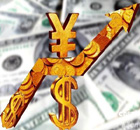Opinion
Taking to the skies with the market
By Hong Liang (China Daily)
Updated: 2010-04-10 17:50
 |
Large Medium Small |
It is easy to understand why China Eastern Airlines' dynamic chairman Liu Shaoyong felt so unhappy about the loss of a big slice of income to ticketing agents.
Despite their monopolistic position, members of the airline oligarchy have little to show for in terms of profitability. Some of the past problems, such as high fuel cost, were outside the control of the airline executives. Bad business can't be blamed for the low return because the increase in passenger traffic has ensured that there were never too many empty seats in most flights. What's more, the airlines, it seems, have done a credible job of controlling their operating costs.
Maximizing income must be the priority in the minds of Liu and other airline executives. Pricing is, of course, a matter that they cannot decide on their own. But there are ways to increase income without raising fares.
Taking back some of the sales from the ticketing agents seems like a sound idea. But the sales channel of one airline can only woo those loyal customers who are unwilling to take the flights of competing airlines irrespective of scheduling and price. Many more customers would prefer to book their tickets from agents who offer them a choice of all airlines.
Airlines in the United States have demonstrated that there is a direct and effective way to raise income: charge their passengers baggage fees.
It was a controversial move born out of desperation at a time when many US airlines were hit hard by high cost and the sharp fall in passenger traffic after the outbreak of the financial crisis in early 2008. Widespread protests against baggage levy by angry customers have gradually turned to grudging acceptance.
To the surprise of many airlines, baggage fees are now an important source of income. Citing figures from the US Transportation Department, The New York Times reported that the total baggage fees charged by airlines rose to $2 billion in the nine months to September 30, 2009, from $464 million for the whole of 2007.
What's more, the levy has persuaded many passengers to travel lighter, resulting in substantial savings in handling and other costs to the operators. The reduction in personal baggage carried on each flight has made room for more cargo, which brings in additional income to the airlines.
| ||||
This, of course, is most unfair to other passengers. The problem can be solved by charging a fee on check-in as well as carry-on luggage.
Such a fee would almost certainly stir up a storm of public protest. But the benefit it would bring to the airlines as well as their customers should become obvious over time.
As the economy becomes progressively market-oriented, Chinese consumers must understand that they will have to pay the market price for goods and services. Air travel is no exception.
jamesleung@chinadaily.com.cn












